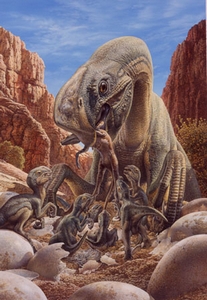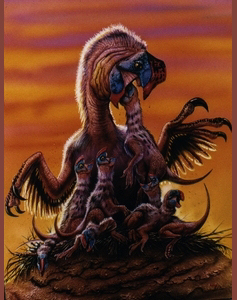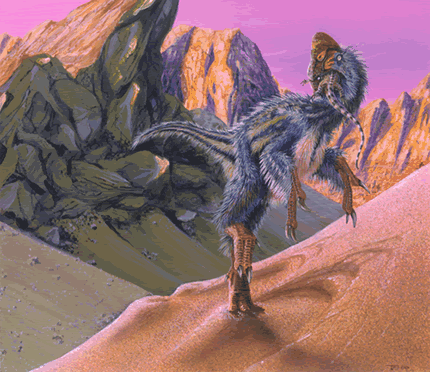Oviraptor mongoliensis - Cretaceous Dinosaurs
Homepage > Cretaceous Dinosaurs - Oviraptor mongoliensis
(oh-zih-rop-tore)
"egg robber"
Describer Osborn, 1924
Also Known As --
Type of Species mongoliensis
Order Saurischia
SubOrder Theropoda
InfraOrder --
Micro-Order --
Family Oviraptoridae
Size 8 feet (2.4 meters) long
Period Late Cretaceous, 70 million years ago
Fossilsite Mongolia
Diet Carnivore
Oviraptor was a bipedal carnivore that lived during the Late Cretaceous Period, about 70 million years ago, in what is now Mongolia. Oviraptor was the same size as velociraptor, but velociraptor came from a different dinosaur family. Oviraptor was not as well armed as velociraptor. It had an unusual shaped skull. It was a toothless skull, with a high crest, a short beak, and a paired of cone shaped prongs on the roof of the mouth. The strong beak and prongs were ideal for eating eggs.
Above the snout was a small bump-lump like the beginnings of a rhinoceros horn. the muscles that worked the jaws of Oviraptor were extremely powerful, and its bill could easily have beaten through an arms' bone. Oviraptor tail was not used as a weapon, but the predator could not have hunted without it. The tail would serve as a counterbalance to its head and its body, and while attacking its prey its tail was again crucial for its balance.
Discovery
Oviraptor was discovered in 1923, near a nest of dinosaur eggs
ever found in Asia. In this same site, Protoceratops was the most common
dinosaur, so oviraptor was thought to have been an egg thief who became
buried in sand while stealing Protoceratops eggs. This is what gave Oviraptor
its name. Seventy years later, more nests were found in China and Mongolia,
including a fossilized Oviraptor sitting atop of eggs. Oviraptor is now
known to have been laying on its own unhatched eggs. This dinosaur was
an egg protector, not an egg thief!
Oviraptor mongoliensis Paleo Gallery
Click on images to see more art from artist!


